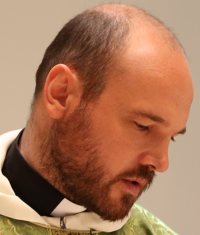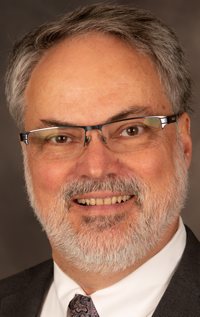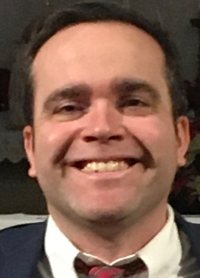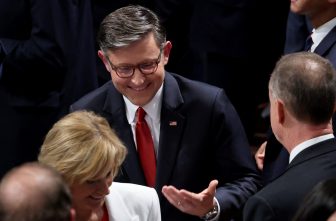
Father Pietro Rossotti, adjunct instructor at the St. Paul Seminary in St. Paul, knows a great deal about the late Pope Benedict XVI’s writings, attended talks he gave before his papacy, and teaches an elective course at the seminary that focuses on Pope Benedict.
But most memorable, Father Rossotti said, was the way he saw Pope Emeritus Benedict XVI in Rome celebrate a private Mass in 2015; Father Rossotti concelebrated the liturgy along with about a dozen other members of his order, the Priestly Fraternity of the Missionaries of St. Charles Borromeo.
“You could immediately tell that he was experiencing the presence of God,” said Father Rossotti, 43, who grew up in northern Italy listening to the man who would become Pope Benedict XVI and “reading everything he wrote that was published.” Father Rossotti also attended several of then-Cardinal Joseph Ratzinger’s conferences and talks. And he attended the pope’s Jan. 5 funeral at the Vatican.

Father Rossotti, who also serves as parochial vicar at St. Peter in North St. Paul, said he personally experienced the pope’s holiness and attentiveness. After editing “a short book” in 2017 on the pope’s lectures to seminarians, Father Rossotti sent Pope Emeritus Benedict XVI a copy. The pope replied with a handwritten note: “Thank you very much for the beautiful book.” And, through his secretary, asked for 25 more copies. Father Rossotti sent him 50.
Christopher Thompson, a professor and academic dean of the seminary who teaches moral theology and serves as director of the Institute for Theological Research, said Pope Benedict XVI’s legacy as a pope and theologian will be of major significance “for many, many years to come.” At the heart of his leadership and scholarship was the late pope’s “personal integrity in the search for God,” he said.

The pope had an “incredible capacity for synthesis of a vast number of sources,” Thompson said. “Not only was he master of the sacred Scriptures, but he had also mastered in many ways the apostolic Fathers and the early Church tradition. And he had this extraordinary capacity for cultural insight and spiritual insight in terms of modernity.”
Thompson said Pope Benedict XVI took seriously “the ordinary human heart’s desire to resolve the drama of death and suffering, and to resolve the quest for lasting happiness,” and persuaded and led others to the person of Jesus in that search.
Father Rossotti said he believes Pope Benedict XVI wanted a Church that was more theological, more divine, more focused on the spiritual and less concerned with temporal affairs.
“I think what Benedict wrote and said should be pondered for many years, and the fruitfulness of his magisterial teaching and of his life will be revealed to us in time,” Father Rossotti said. “For me, he was a teacher and a father in the faith.”
Parish music director composes hymn honoring the late pope
Jacob Flaherty, director of sacred music at Holy Family in St. Louis Park, had a busy evening of musical performances Dec. 31 — from playing the organ during 5 p.m. and 11 p.m. Masses, to playing carols on a piano during a private party in between — but by the time he left the party, he had an idea for a musical composition inspired by Pope Emeritus Benedict XVI’s reported last words that day: “Lord, I love you.”

Flaherty, 41, felt compelled to spend a couple hours overnight writing words and music for a composition honoring the late pope. The church choir performed it at 9 a.m. Mass the next day.
The motivation behind the piece is an appreciation for having in Pope Benedict XVI “an authentic witness,” Flaherty said. “Because you have this very intellectual, learned theologian who studied … lots of complexity in theology and all of these scholars and amazing books,” he said. “But when it came down to it, at the end of his life, he kind of put his money where his mouth was. And it was ‘Jesus, I love you.’
“So it was like the perfect way, where all theology goes, if it’s done properly, it’s to a greater love of God,” Flaherty said. “I think our world needs authentic witnesses.”
Everyone hopes what they see in public is what happens in private, Flaherty said. “We all want our heroes to be heroes and not just pretending,” he said. “So, there’s something just very real and super relatable about him saying that (Jesus, I love you).” Those words are sung in German because initial reports after the pope’s passing indicated that’s how he said them, Flaherty said.
Two of the verses are written in Latin, indicating “more of the universality of the Church,” Flaherty said, and one in English. The three verses express different elements of love, he said, reciting:
1 Cor 13:2: “If I have a faith so as to move mountains but have not loved, I have nothing.”
1 John 4:7: “Anyone who loves is begotten by God and knows God.”
1 Corinthians 13:13: “And now these three remain: faith, hope and love, but the greatest of these is love.”
The verses also connect to the pope and his last words, Flaherty said. “Here’s a man who has all knowledge so as to move mountains, but (knows) without love, you have nothing,” he said. “Then anyone who loves is begotten by God and knows God … He obviously had a love for the Lord. And then ‘the greatest of these is love.’ Well, his last words were ‘Jesus, I love you.’ The greatest of these is love.”
The words in Scripture struck Flaherty as “almost a support structure for this very simple act of devotion that the pope made,” he said.
The composition’s style is “kind of its own thing,” he said — “kind of traditional but kind of not in some ways” — but the closest comparison would be a blend of Taizé chant (lots of repetition; quiet, contemplative) and “a Renaissance polyphony style” (interwoven melodic lines.)
Communion at Mass would be a fitting time to perform the work, Flaherty said, “because it’s all about ‘Jesus, I love you.’” “And that’s a very intimate time of the Mass where we can speak those words to him.”
Flaherty found Pope Benedict XVI to have a similar demeanor to Father James Reidy, now retired, “a wonderful priest” who served at Holy Childhood when he grew up. “He’s very academic, his homilies were always kind of deep and I appreciate priests who tell stories, but I also appreciated Father Reidy’s depth, talking about Cardinal Newman and Chesterton,” Flaherty said.
Pope Benedict XVI seemed to be in the same mold as Father Reidy, Flaherty said — “same demeanor, quiet, thoughtful, loving and just very theologically interesting and deep.” When Cardinal Joseph Ratzinger became pope, Flaherty said he was drawn to him “because I liked that sort of thoughtful, theological nuance that (he) brought to the table.”
Flaherty’s composition has been sung at the Cathedral of St. Peter in the Diocese of Wilmington, Delaware, and at one other church, he said. It was to be sung at the Cathedral of St. Paul in St. Paul at a Mass Jan. 4 in honor of the late pope, but the Mass couldn’t be held due to a snowstorm. Flaherty said he expects it would be performed if the Mass for Pope Benedict is rescheduled.




